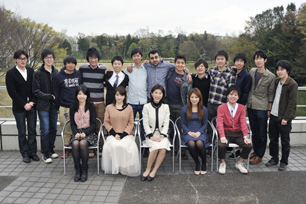Yoko Hirose, Associate Professor, Faculty of Policy Management
Reading the world by region
Aiming for dialogue and integration between area studies and academic disciplines
Three second-year students, six third-year students, and ten fourth-year students study together to deeply understand international politics through area studies of various regions around the world, and to seek dialogue and integration with academic disciplines.

After the end of the Cold War, as it has become possible to research areas that were difficult to visit during the Cold War and as ideological biases have been reduced, area studies in their true sense have become possible, and have gained popularity in the world of academia. However, area studies still don’t seem to really fit in the world of academia. This is because regional researchers tend to stress particularities of the area which one is researching, many times becoming preoccupied with a one-sided release of information. It is true that the more you study a particular region in detail, the more you find the particularities of the region, so it may be natural to have such tendencies. However, if that is the case, it will be no more than self-satisfaction of the researcher, and we cannot expect progress of research within the world of academia as a whole.
Therefore, in my seminar class, we aim to seek dialogue and integration among area studies and academic disciplines by conducting studies that enable us to apply area studies to a broader academic context. Instead of concluding area studies by just studying issues of a particular area, we aim at making academic contributions, focusing on making the most of our studies in a broader academic context and making it possible to have dialogues with researchers and theorists specialized in other areas.
Research subjects of my students are wide-ranging and include various regions and themes, so we work on having dialogues on area studies of the same variety. Using our two weekly seminar classes and additional training camps, each student does a presentation of his/her personal research as well as participating in group research and presentations on “comparative studies of regions” for which we choose a different theme and region every semester. Each person also takes turns reading chapters from the textbook.
Graduate students and my former students also attend my seminar class, so we have high-quality discussions every time. Members of the class get acquainted through group research and training camps that are held every summer and winter. Graduates also have strong bonds, and graduates of my former seminar class that I held from 2002-2005 when I was Assistant Professor of the Faculty of Policy Management sometimes gather for a meeting with my present students. I pursue my studies with my students on a daily basis hoping that the seminar class be not only a place to master one’s studies but also a place to establish important personal relationships.
Student's Voice
Hiroto Sawada, Fourth-year Student,
Faculty of Policy Management
Diverse world from a diversity of perspectives
If I were to explain the seminar class of Professor Hirose simply, “diversity” would be the perfect word for it. Although Professor Hirose is specialized in international politics (especially that of the Caucasus region), we students (without any regard for our teacher’s focus) really have interests in various fields and regions. Some students choose a country or region within Asia or Africa for the subject of their studies, while others skillfully bring in knowledge from other disciplines such as sociology or network analysis. It is not only in our studies but also in our drinking parties that we can often come across a diversity of scenes. Our professor accepts our (mostly intellectual) diversity, which always creates a positive chemical reaction between her and us students. You could say that this is the most ideal environment to learn about a world full of diversity.
*Position titles, etc., are those at the time of publishing.
